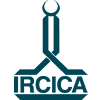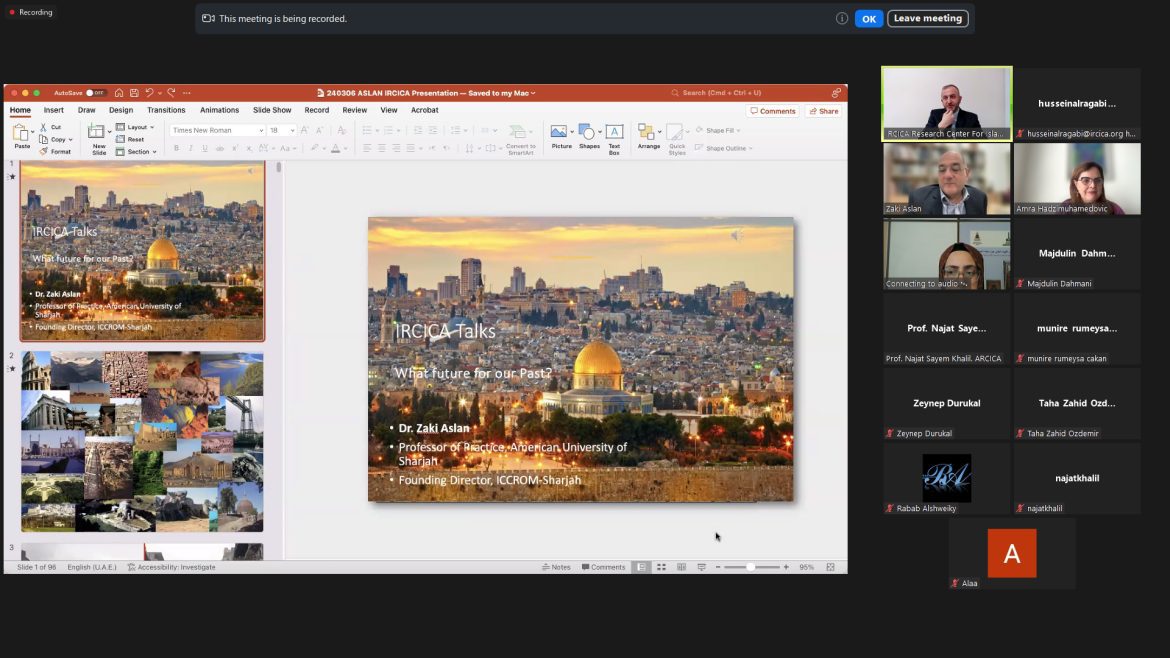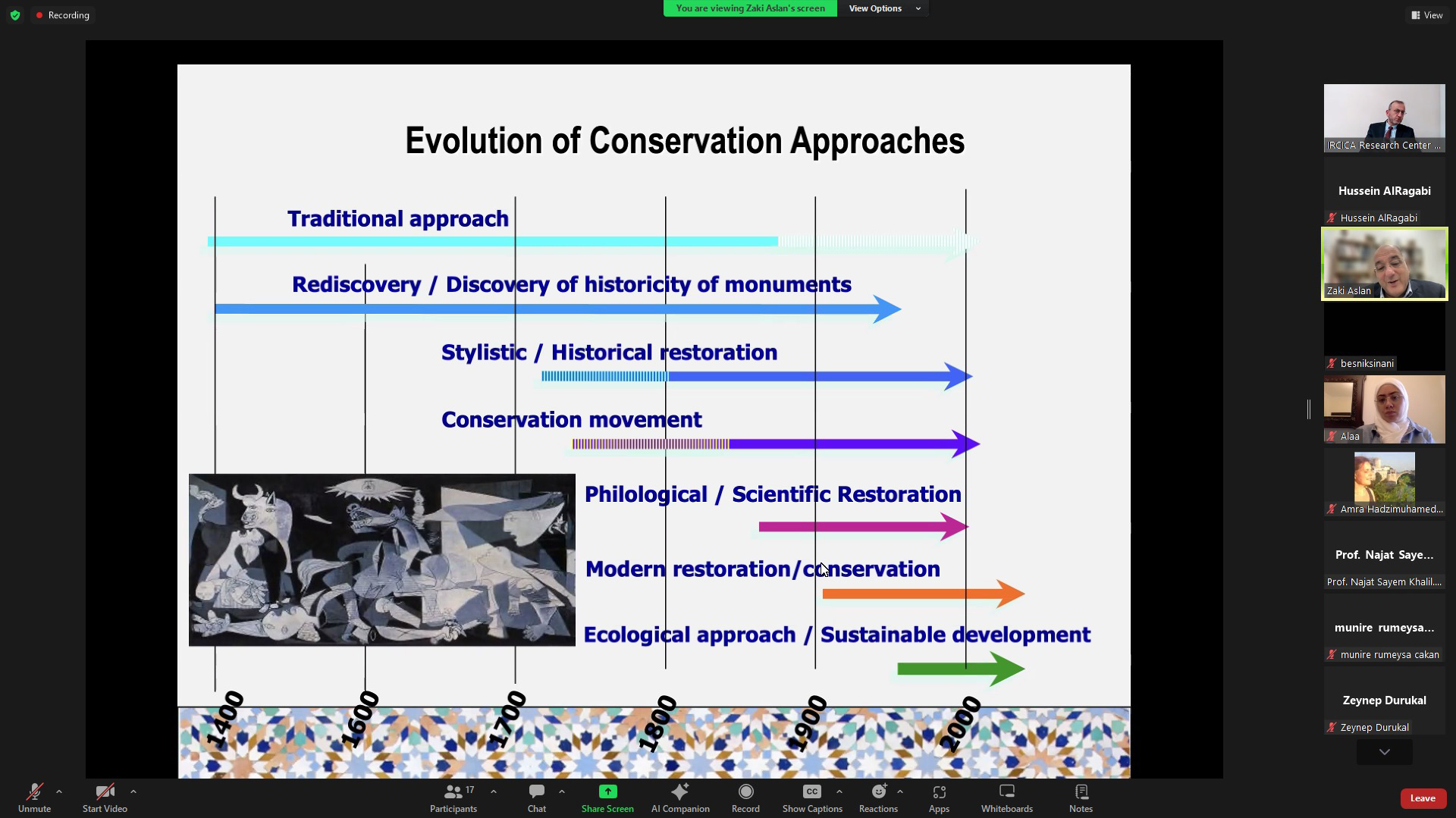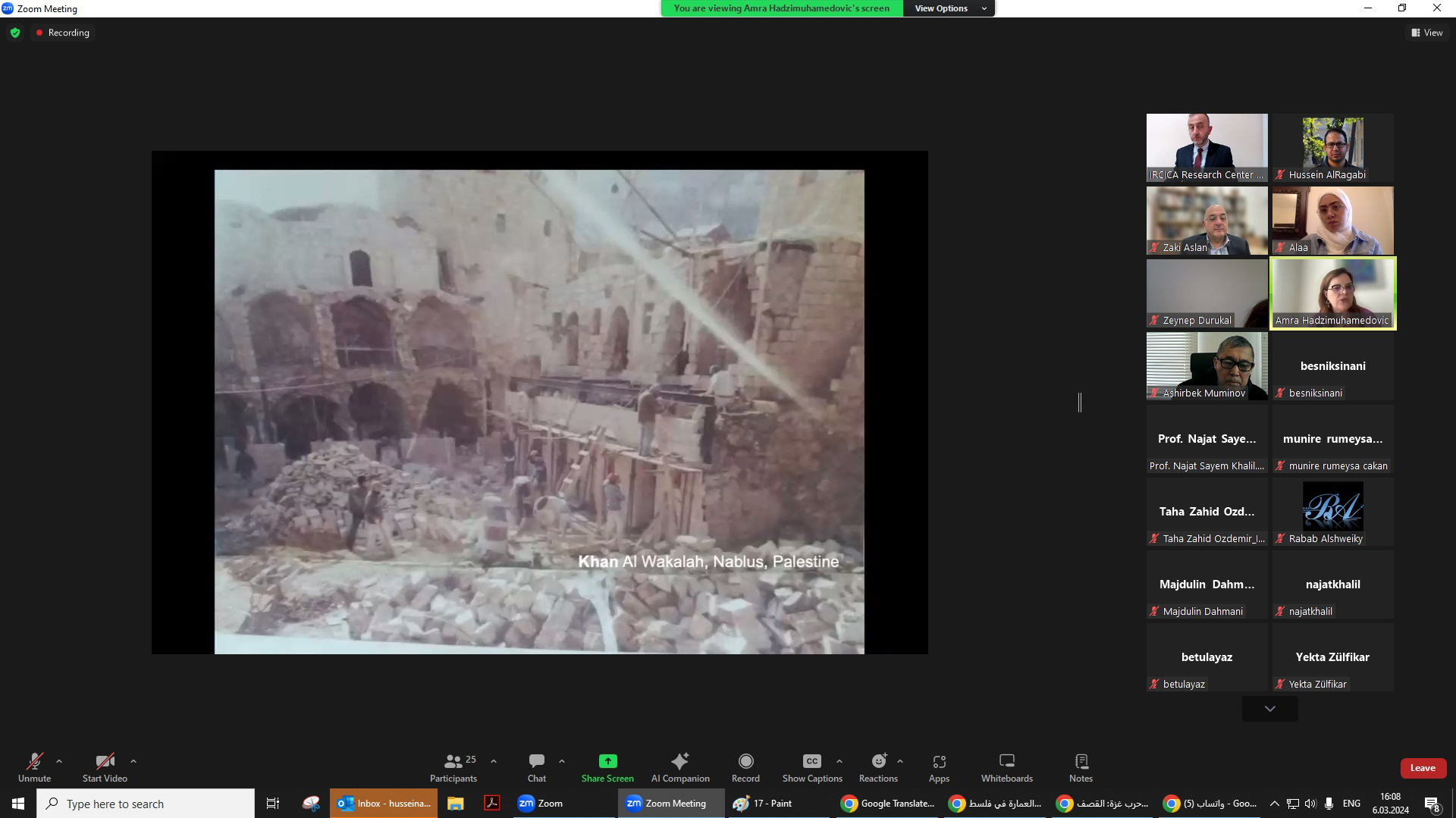The online panel titled “Safeguarding Legacy: Emerging Cultural Heritage Issues” conducted in the series of “IRCICA Heritage Talks” on 6 March 2024 was addressed by the experts Dr. Amra Hadzimuhamedović and Dr. Zaki Aslan. Researchers working on heritage conservation in different countries attended the panel, contributing to the Q&A discussion.
Dr. Zaki Aslan gave a talk titled “What Future to our Past? Cultural Heritage Places and Artwork in a Regional Context,” highlighting perceptions and practices of cultural heritage conservation and how they evolved, based on his 21 years of experiences as founding Director of ICCROM Sharjah and projects conducted in different countries. Offering glimpses at different cultural landscapes in the Middle East and the Gulf region, Aslan described the approaches adopted in different reconstruction and conservation projects depending upon local conditions and how perspectives have evolved over time; he gave examples of projects relating to historical sites in conflict areas in Iraq, Jordan, Lebanon, Syria, Yemen; pointing to specific issues regarding each case and how they were dealt with. He reviewed the evolution of outlooks that governed in conservation projects that involved a balance between the modern and the historic parts of cities such as in Sharjah-UAE and the upgrading of archeological riches for public view through museum developments as in Doha-Qatar. Since the turn of the century, one of the main changes has been the inclusion of intangible heritage in conservation perspectives which relates to the people who used those places and how they used them, along with the material, tangible aspects of heritage. Other changes include the transition from “restoration” to “urban development,” from monodisciplinary to multidisciplinary engagement; from the restoration of monuments to preservation of urban values as part of a global concept of the “city.” Dr. Aslan also alluded at the evolution of the international treatment of reconstruction and conservation in the present century, where these concepts are reflected in the UN SDGs. Dr. Zaki Aslan is an architect, planner, educator and advisor in the cultural and heritage fields. He served for 21 years as the founding director of ICCROM-Sharjah Regional Conservation Centre, United Arab Emirates, where he led programs for the Arab Region, from Rome, Italy (2003-2011) and later from Sharjah, UAE (2012-2023). He led projects and offered technical guidance on heritage conservation/ management, national planning/ policies, World Heritage, field projects (including public outreach, capacity building and curricula development), with UNESCO, EU, GCI, British Council, USAID, and the Kingdom of Saud Arabia.
Dr. Amra Hadžimuhamedović spoke about “Authenticity and identity in Muslim Heritage Practices Today.” She discussed the notion of “authenticity” of cultural heritage assets as markers of cultural identity and the evolution of this notion since it was first mentioned in the Venice Charter in 1964. At the outset, notions such as this one used to be expressed in material terms only, which was challenged in later times in the changing contexts of conservation projects in different continents. She said that regarding the Old Bridge in Mostar, for example, the people demanded restoration not only for the sake of the tangible bridge structure but also as a memorial of the war, where restoration was more dominantly for the intangible than the tangible. The speaker gave examples of different monuments, where reconstruction sometimes needs to balance between what is desirable and what is achievable in terms of preserving authenticity. A marking example is the Dome of the Rock, where the identity paradox lies in that although a majority of its sections date from the 20th century, it still is a monument from the 7th century. Considering the Holy Ka’ba, for example, it always remains the same celestial Ka’ba after its parts are repaired and restored. As Grabar notes, she said, “the bearer of authenticity lies in the sacred character of a monument”; demolishing and rebuilding a structure does not impact its authenticity. Dr. Amra Hadžimuhamedović was the leading heritage expert in the process of implementation of Annex 8 of the Dayton Peace Accord for Bosnia and Herzegovina and managing diverse projects of integrating cultural heritage into postwar recovery in Bosnia, Kosovo, Palestine, and Iraq. She worked as a consultant for UNESCO, ICCROM; World Bank, ICOMOS International, OSCE and other programs. She taught History of Architecture and Architectural Conservation at the International University of Sarajevo (2010-2019), guest-lectures at universities in USA, Europe, Arab Region, and publishes widely on heritage reconstruction.
During the Q&A discussion, some attendees spoke about their ongoing research in related fields. Answering a question, Dr. Zaki Aslan underlined the notion of community museums, which is a new way of making sure that sites, as museums can be places of reconciliation, where people share their memories, their heritage, where conservation also involves connections with the world community.







